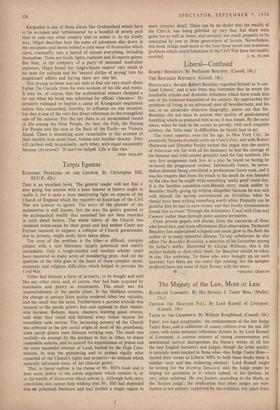Turpis Egestas
ECONOMIC PROBLEMS OF THE CHURCH. By Christopher Hill, (O.U.P., 42s.) THIS is an excellent book. The general reader will not find it easy going, but anyone with a keen interest in history ought to tackle it, for it casts a most penetrating light on aspects of the Church of England which the majority of historians of the Civil War are content to, ignore. The story of the plunder of the monasteries is well known, but the way the gentry gnawed at the ecclesiastical wealth that remained has not been recorded in such detail before. The whole fabric of the Church was rendered worm-eaten by their greed and had neither Court nor Puritan required its support, a collapse of Church government, due to poverty, might easily have taken place.
The crux of the problem is the tithe—a difficult, complex subject with a vast literature, largely polemical and mainly unreadable. Only a tough-minded and resolute scholar could have mastered so many acres of mouldering print. And yet the question of the tithe goes to the heart of those complex social, economic and religious difficulties which helped to provoke the Civil War.
Tithes had become a form of property, to be bought and sold like any other rents, and, of course, they had been acquired by merchants and gentry as investments. The result was the impoverishment of the parish priest. In the Midland counties, the change to pasture from arable rendered tithes less valuable, and the result was the same. Furthermore a puritan. attitude was inimical to the parish priest's fees and opposed to their reason- able increase. Bishops, deans, chapters, wanting quick returns, sold what they could and bartered away future income for immediate cash returns. The increasing poverty of the Church was reflected in the low social origin of most of the priesthood; some parish priests were illiterate working men. The result was twofold—an attempt by the puritans to buy in tithes, to create reasonable salaries, and to control the appointment of priests and the more successful attempt of Laud, backed by the High Com- mission, to stop the plundering and to protect rigidly what remained of the Church's rights and property—an attitude which naturally infuriated many of the tithe-fat gentry.
That, in barest outline, is the theme of Mr. Hill's book and it does scant justice to the subtle argument which sustains it, or to the wealth of illustration which adorns it. Although both carry conviction, one cannot help wishing that Mr. Hill had depended less on polemical literature and had studied a single region in
more complex detail. There can be no doubt that the wealth of the Church was being gobbled up very fast, but there were gains too as well as losses, and certainly too much property to be consumed by two or three generations of locusts. Nevertheless, this book brings once more to the fore those social and economic problems which recent historians of the Civil War have too readily


































 Previous page
Previous page